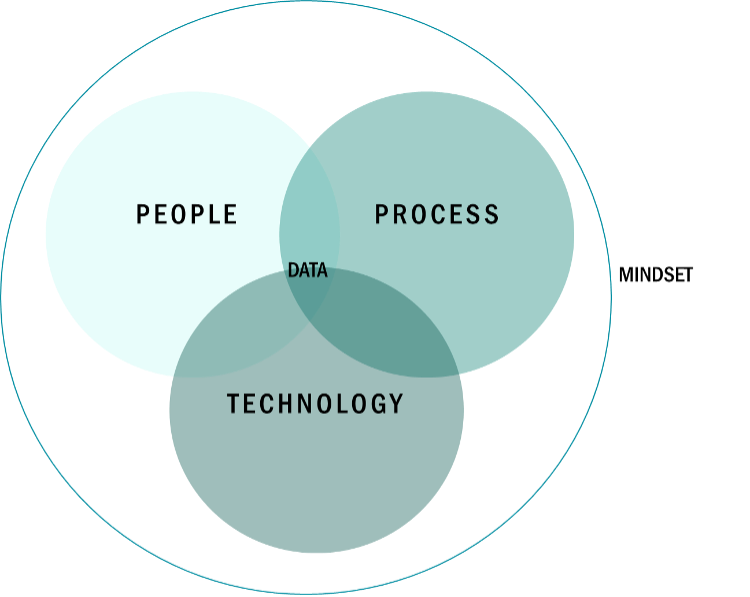Key Enablers for a Successful Digital Transformation
In consulting, the framework “people, process, and technology” is frequently used due to its simplicity of explaining how to successfully implement any organizational change. For the digital space, this framework is still valid, with two critical additions: data and mindset. Each of these key enablers for digital success is crucial and works together to provide an edge for firms in competitive industries. Below, we discuss the five key enablers for successful digital transformation and how firms should best approach them.
5 Enablers for Successful Digital Transformation
People
People are pivotal in every aspect of digital strategy. From streamlining work processes to maximizing the use of available technology and raw data, a firm’s employees are one of the factors that create unique value propositions. Recent talent shortages in tech make prioritizing current and prospective employees all that much more crucial. Firms should actively stay ahead of the hiring curve by anticipating needed employees. Perhaps even more importantly, firms should work to retain their current employees by investing in strategies like upskilling. Ensuring the best workforce is an important first step in achieving digital success.

In addition to internal talent and capabilities, it’s critical for companies to ensure they have the right partners, agencies, and vendors in place to execute their digital strategies. Specifically, companies should maintain an active digital capabilities roadmap that shows the balance of in-house versus outsourced capabilities and how this evolves with digital maturity.
Process
Next, a company’s process – how they manage and complete tasks –must also be optimized for digital. It’s critical for organizations to prevent siloing, which companies are at risk for given the cross-functional nature of digital. Siloing can cause inefficient work, incomplete analyses, and innovation left on the table.
As digital strategy touches nearly every business function, fostering cross-functional collaboration and clear ways of working is essential Ultimately, it’s important to establish a clear delineation of responsibilities alongside methodologies through which teams can connect to optimize a firm’s digital strategies.
Technology
Technology is perhaps the most obvious segment of digital strategy, yet firms shouldn’t discount the importance of planning for it. Digital transformations should be anticipated and budgeted for well in advance. The rapid pace of emerging technologies like the Internet of Things (IoT), AI capabilities, blockchain, and other virtual services necessitates a need for constant innovation in firms to retain competitive advantages.
Upgrading and improving the technology used by a firm should not only be done because a technology is a “shiny object” and the latest trend, but instead should be a deliberate business decision. Additionally, firms should understand what technology is needed for their services or products in the future and plan for the right marketing technology stack to execute their digital plans. They should consider how each investment serves the business objectives that they aim to achieve in order to identify and prioritize those that are mission critical.
Data
Data is the fuel for digital success. Without the right data set-up, governance, and strategies, digital efforts will not reach their fullest potential. Data serves as the glue between people, processes, and technology that enables decision-making and optimization. Thus, the importance of data in informing, executing, and optimizing any digital strategy cannot be understated. Proactively setting up an effective data and governance strategy ensures that the right teams are connected and have access to data analyses. Firms should have actionable dashboards to easily view insights that have been created by data teams working alongside firm leadership.
Digital Mindset
The mindset of a company and its employees determines how they react to internal and external challenges. Below, we outline critical components to adopting a digital mindset:
- Become Consumer-Centric: Focusing on customer needs is an essential pillar for any company looking to grow and retain customers This is achieved by delivering the best consumer experience possible and anticipating industry changes that could affect their needs.
- Be Agile: A firm’s digital strategy must incorporate elements of flexibility to meet unanticipated challenges and strains. Consequently, a firm’s mindset and overarching digital strategy should be ready to adapt. By leveraging agile methodologies through constant collaboration between company leadership, respective cross-functional teams, and partners, a firm can ensure the best course of action in any new scenario.
- Test, Learn, and Optimize: Successful digital companies have a curious mindset and encourage their teams to constantly test, learn, and improve. Fostering a culture where working with minimal viable products (MVPs) to test and optimize requires consistent managerial support, trainings, and key amplifiers in the workspace.
Achieving Digital Success
Ultimately, the old expression of “people, process, and technology” can still hold true for digital with the critical additions of data and a digital mindset. Organizations need to be customer-centric and agile, as well as test and learn often, to stay relevant with their customers.
Data is a critical enabler to that digital mindset, as are the people, processes, and technologies an organization has in place. While successful digital transformation certainly looks different to each company, these critical success factors remain relevant for any digital strategy.
Subscribe to Clarkston's Insights
Contributions from Jake Park-Walters



